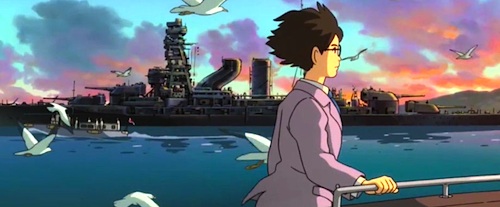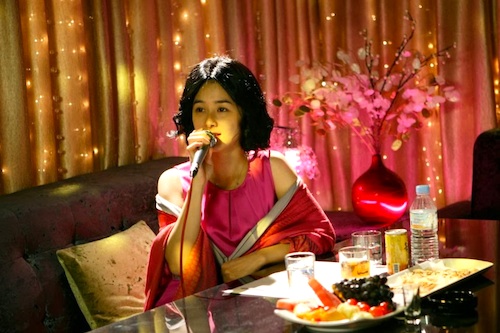By Joe Bendel. Jiro Horikoshi is a Studio Ghibli character Tony Stark would approve of. He was the engineer responsible for designing Imperial Japan’s Model Zero fighters, but he was a dreamer rather than an ideologue. At least, that is how Hayao Miyazaki re-imagined Horikoshi’s private persona in his fictionalized manga, which he has now adapted as his final film as a director. Spanning decades of Japan’s tumultuous pre-war history, Miyazaki’s The Wind Rises is also a deeply personal film that screens as a main slate selection of the 51st New York Film Festival.
As a young student, Horikoshi yearns to fly, but he realizes his spectacles make it nearly impossible for him to become a pilot. Borrowing an aviation magazine from an encouraging teacher opens up a new path for the earnest lad. Through its pages he learns of Italian aircraft designer Gianni Caproni, who becomes his inspiration. Setting his sights on an engineering career, Horikoshi regularly meets Caproni in his dreams and reveries, where they share their mutual passion for flight.
Circumstances of history will conspire to make Horikoshi’s life eventful. His first day as a university student is marked by the catastrophic earthquake of 1923, which will resonate profoundly with contemporary viewers. Yet, out of that tragedy, Hirokoshi meets and temporarily loses the great love of his life.
Despite his intelligence, Japan’s stagnant economy offers few opportunities for Horikoshi when he graduates. He joins Mitsubishi at a time when the company appears to be on its last legs. Gambling its future on military contracts, the company sends Horikoshi to Germany, hoping he can help them reverse-engineer whatever the Junkers will let him see. Of course, he will be able to raise their game substantially.

In no way, shape, or manner does Miyazaki justify Japan’s militarist era, but he has still taken flak from both sides of the divide over Wind. Frankly, it presents a gentle but firm critique of the Imperial war machine. At one point, Horikoshi is even forced into hiding, designing the military’s fighter planes while he evades the government’s thought police. Indeed, such is a common experience for the best and the brightest living under oppressive regimes. Yet, Miyazaki is just as interested in Horikoshi’s grandly tragic romance with Naoko, a beautiful artist sadly suffering from tuberculosis. Horikoshi makes a number of choices throughout the film, every one of which the audience can well understand.
Given its elegiac vibe, Wind makes a fitting summation film for Miyazaki. Covering the immediate pre-war decades, it compliments and engages in a wistful dialogue with Gorō Miyazaki’s post-war coming of age tale From Up on Poppy Hill (co-written by the elder Miyazaki). One can also see and hear echoes of master filmmakers past, such as Ozu and Fellini, throughout the film. Any cinema scholar surveying Miyazaki’s work will have to deal with it at length, but it still happens to be a genuinely touching film.
After watching Wind, viewers will hope the real Horikoshi was a lot like Miyazaki’s (and the same goes for Caproni). Miyazaki seriously examines the dilemmas faced by his protagonist while telling a lyrical love story. Visually, the quality of Studio Ghibli’s animation remains undiminished, but the clean lines of Horikoshi’s planes and the blue open skies lend themselves to simpler images than some of his richly detailed classics. Regardless, The Wind Rises is an unusually accomplished film that transcends the animation genre. Highly recommended for all ages and interests, it screens this Saturday (9/28) and next Friday (10/4) at Alice Tully Hall (stand-by only), as part of the 2013 NYFF.
LFM GRADE: A
Posted on September 24th, 2013 at 1:42pm.
